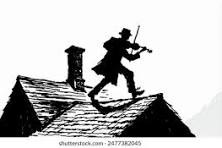When I was about ten years old, our family went to see Fiddler on the Roof in New York City. The excursion, unusual for us, produced many memories, starting with the witty, funny, and often poignant songs. But one memory from that day stands out like a great book, revealing more each time I return to it.
That memory is of my father’s enigmatic answer when I asked him what the musical’s strange title meant. In words suited to a child, he said that the fiddler is a symbol for the Jew’s precarious position in a hostile world. Tevye must handle the winds, the weather, and the slippery shingles while making music. One misjudged step and he will come crashing down.
I don’t recall where the conversation went from there. Most likely, I returned to the things that preoccupied me in 1969: Topps baseball cards, Dairy Queen Dilly bars, and my favorite basketball team, the New York Knicks. It was self-evident that baseball and basketball players were more relevant than Tevye, who, after all, was an imaginary character, and whose shtetl, Anatevka, was so foreign to my own world that it might as well have been on Mars.
And yet, some part of my mind made a point of preserving that brief father-son exchange. It was as if something other than the conscious “I” said, Eventually this will be important—hang on to it.
That was Act One.
Almost forty years later, in 2006, Hezbollah’s terror army invaded northern Israel, killing three soldiers and kidnapping two others, triggering a war. While rooting for the Jewish state, I tried to fathom the enemy’s strategy. Didn’t they know they were going to be beaten decisively?
It was in thinking about the enemy that that long ago conversation with my father returned to me. The Jews of Israel were nothing like Tevye, who could only endure, and not resist, Czarist Russia’s oppression. And yet, despite Israel’s extraordinary military capabilities, despite its nuclear arsenal, the Jewish state remained, in some way, like Tevye, a fiddler on the roof.
My father’s words, once enigmatic, now seemed oracular. Was there no escaping this condition? Was it possible that no matter how powerful Israel became, it would not be able to distance itself from the haunting image of Tevye, perilously perched on a roof?
Act Two had ended.
On October 7, 2023, the curtain rose on Act Three.
Despite being caught unprepared by Hamas’ murderous onslaught, Israel has fought back brilliantly against its enemies, winning in each of the war’s seven fronts. For American Jews, the war had a new feature—the eighth front opened in the homeland. Hamas supporters built encampments on the greens of many elite American universities and marched through the streets of America’s largest cities. They chanted for the destruction of Israel in Jewish neighborhoods and in front of synagogues. Their chants were tolerated by Ivy League presidents and endorsed by the man favored to be New York’s next mayor.
Their strategy—for now—is to make life unbearable for American Jews. They hope to turn universities like Harvard and Columbia into no-go zones for Jewish students. Whether they will succeed is as yet undecided, but those universities, and certain of their peers, have been exposed as spiritual sinkholes. Notably, Harvard itself has identified its Medical, Education, and Divinity schools as especially egregious promoters of antisemitism.
Given that the schools devoted to the body, mind, and soul have been corrupted, Harvard’s reckoning, which is unfolding now, might be to go the way of all movements and institutions that empower antisemitism, namely oblivion.
I’ll let Harvard worry about itself. In this third act, my father’s words of more than a half century ago removed the last veil from my eyes. I looked down from where I stood and saw my feet balanced on the ridge of a roof.
Tevye is Israel is me.
I say this without anger, or sadness, or, God forbid, self-pity. It is always preferable to understand one’s true position. Indeed, I am fortified by the knowledge that the Jewish people will not lose their balance, because an unseen hand continues to steady and bless them.




I understand your feeling, Barbara.
I remember a quip from a long ago history class about the breakdown of markets during the Great Depression: "The invisible hand disappeared"
I can't think about Jewish history and not marvel at two everlasting themes: wicked regimes with great power try to eradicate us, and we outlast them. In that I see the hand, though that is no comfort to the countless victims of those cruel regimes.
Shabbat shalom
alex
Yes, beautiful writing , but I second Dan whoever he is. That Hand you see is invisible to me.